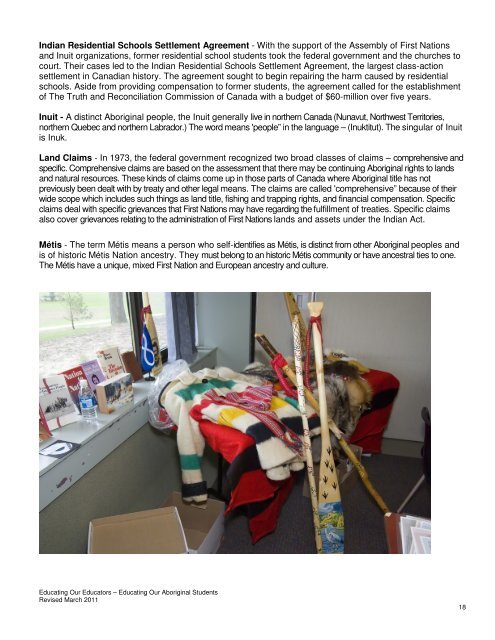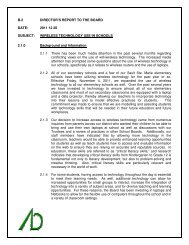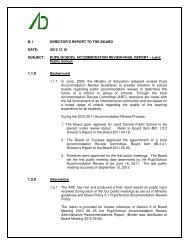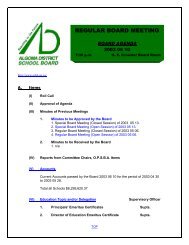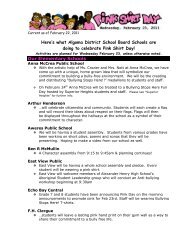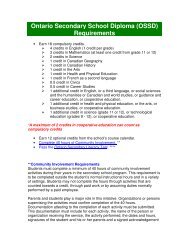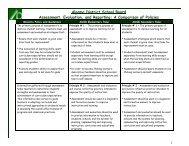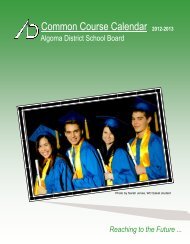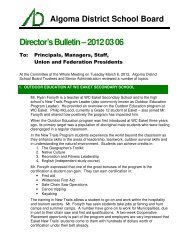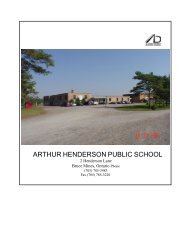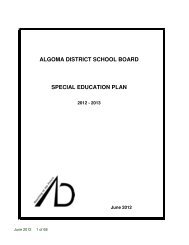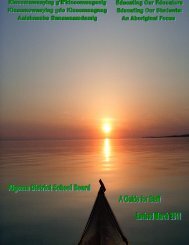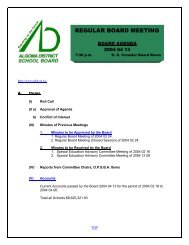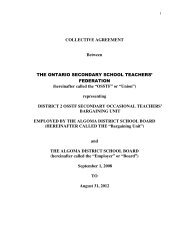Indian Residential <strong>School</strong>s Settlement Agreement - With the support of the Assembly of First Nationsand Inuit organizations, <strong>for</strong>mer residential school students took the federal government and the churches tocourt. Their cases led to the Indian Residential <strong>School</strong>s Settlement Agreement, the largest class-actionsettlement in Canadian history. The agreement sought to begin repairing the harm caused by residentialschools. Aside from providing compensation to <strong>for</strong>mer students, the agreement called <strong>for</strong> the establishmentof The Truth and Reconciliation Commission of Canada with a budget of $60-million over five years.Inuit - A distinct Aboriginal people, the Inuit generally live in northern Canada (Nunavut, Northwest Territories,northern Quebec and northern Labrador.) The word means 'people” in the language – (Inuktitut). The singular of Inuitis Inuk.Land Claims - In 1973, the federal government recognized two broad classes of claims – comprehensive andspecific. Comprehensive claims are based on the assessment that there may be continuing Aboriginal rights to landsand natural resources. These kinds of claims come up in those parts of Canada where Aboriginal title has notpreviously been dealt with by treaty and other legal means. The claims are called 'comprehensive” because of theirwide scope which includes such things as land title, fishing and trapping rights, and financial compensation. Specificclaims deal with specific grievances that First Nations may have regarding the fulfillment of treaties. Specific claimsalso cover grievances relating to the administration of First Nations lands and assets under the Indian Act.Métis - The term Métis means a person who self-identifies as Métis, is distinct from other Aboriginal peoples andis of historic Métis Nation ancestry. They must belong to an historic Métis community or have ancestral ties to one.The Métis have a unique, mixed First Nation and European ancestry and culture.<strong>Educating</strong> <strong>Our</strong> <strong>Educators</strong> – <strong>Educating</strong> <strong>Our</strong> Aboriginal StudentsRevised March 201118
Métis Rights - Although the Constitution Act (1982) affirms and recognizes Aboriginal and treaty rights to Aboriginalpeoples of Canada, which includes Indian, Inuit, and Métis peoples of Canada, it remains an unfulfilled promiseto the Métis peoples. The Government of Canada assumed the position that Métis peoples had no existing Aboriginalrights; thus, refused to negotiate and deal with the Métis peoples in the past. In the 1990's, the Métis began seeking justicein the court system advocating <strong>for</strong> their rights. The Powley court case (March 2003) was the first one to be heard inthe higher court system of September 19, 2003 challenging whether Métis peoples have existing Aboriginalrights. The Supreme Court affirmed and recognizes Section 35 of the Constitution Act 'is a substantive promise to theMétis that recognizes their distinct existence and protects their existing Aboriginal rights”. The Métis National Council states'The Powley decision marks a new day <strong>for</strong> the Métis Nation in Canada. The Supreme Court's decision is a respectfulaffirmation of what the Métis people have always believed and stood up <strong>for</strong>, as well as an opportunity <strong>for</strong> Canada to beginfulfilling its substantive promise to the Métis”. On July 7, 2004, an agreement was made between the Métis Nation ofOntario and Ministry of Natural Resources, which recognized the Métis Nation of Ontario's Harvest Card system. TheMétis peoples who hold a Harvester's Certificate and holds Métis citizenship can exercise their harvesting rights withinhis or her traditional territory and in accordance to the Interim En<strong>for</strong>cement Policy; thus, no violation of conservation orsafety charges would apply. Harvester's Certificate holds a 3 year term and can be renewed annually <strong>for</strong> a fee oftwenty dollars. This initial fee to apply <strong>for</strong> a Harvesters Certificate is sixty dollars. Also, there are a maximum numberof Harvester's Certificates that can be issued annually. There is a mutual agreement that these limits may changefrom year to year which is dependent on historical research and an evaluation on Métis Nation of Ontario's registrysystem and processes.Métis Harvest or Métis Harvesting - Means taking, catching or gathering <strong>for</strong> reasonable personal use andnot commercial purposes in Ontario of renewable resources by Métis Nation of Ontario citizens. Harvestingincludes plants, fish, wildlife and firewood, taken <strong>for</strong> heating, food, and medicinal, social or ceremonialpurposes and includes donations, gifts and exchange with Aboriginal persons.Métis Community - A group of Métis peoples who live in the same geographic area. A community may includemore than one settlement, town or village in an area.Métis Sash - Of all the symbols associated with the Métis culture, the sash is perhaps the most widelyrecognized and best known. Wrapped about the midsection, it was used by Voyageurs to carry theirbelongings during their transportation duties. As the Métis took tremendous pride in their clothing, the sash,being an attractive piece was highly valued <strong>for</strong> its aesthetic presence. Often, a decorative beaded pipe bagwas added to the Voyageur's outfit, being suspended from his sash. As well, it was valued <strong>for</strong> its practicalityand versatility. It was warm in the colder seasons and could be used as a rope when none was available.The art of weaving the sash was brought to the western regions via Voyageurs who had encountered thebright 'scarves' through contact with French Canadians. The sash has acquired new significance in the 20thcentury, now symbolizing pride and identification <strong>for</strong> Métis people. Manitoba and Saskatchewan have bothcreated "The Order of the Sash" which is bestowed upon members of the Métis community who have madecultural, political or social contributions to their people.Métis Sash<strong>Educating</strong> <strong>Our</strong> <strong>Educators</strong> – <strong>Educating</strong> <strong>Our</strong> Aboriginal StudentsRevised March 201119


